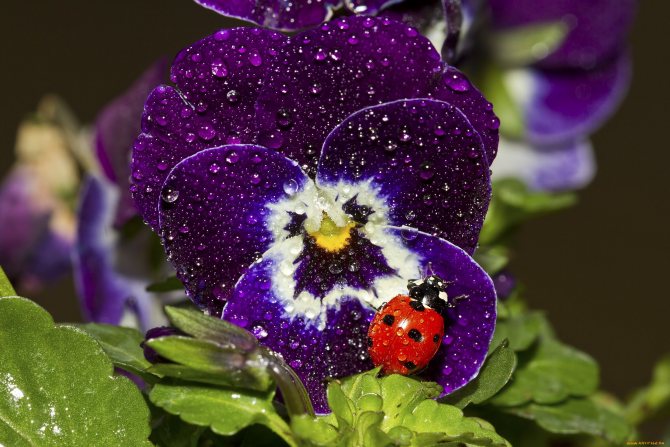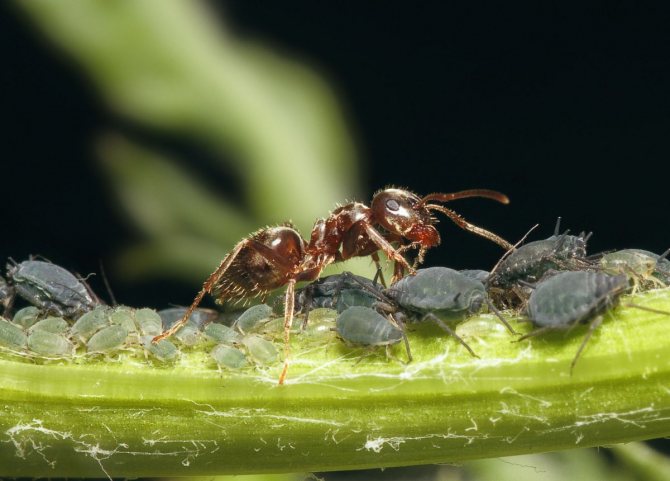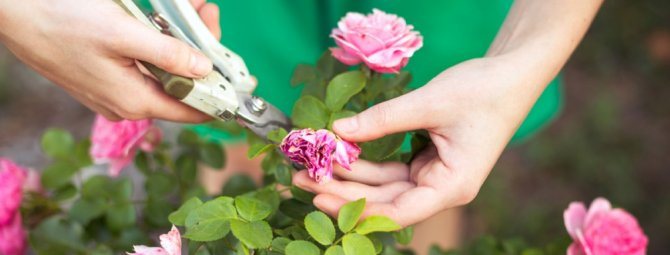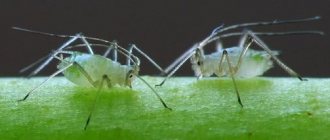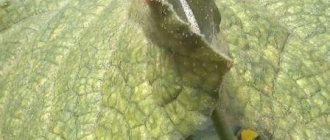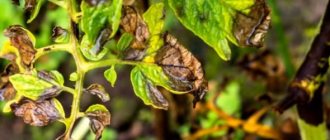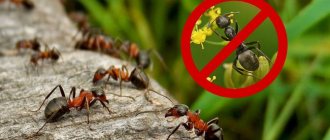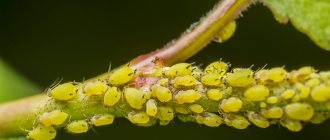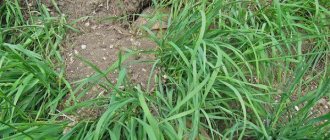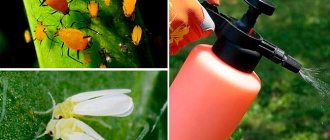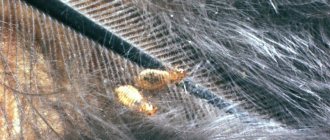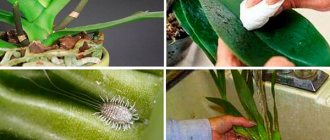Symptoms of the defeat of a room rose by aphids
For a long time, the insect hides under the lower leaves of the plant, which complicates the detection of the parasite at an early stage of infection. Gradually, the aphid colony grows, mastering the entire space of the flower pot.
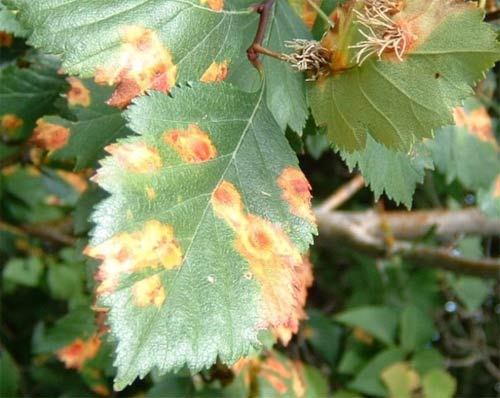
Yellow spots on the leaves of the rose.
For early detection of insects, it is recommended to pay attention to the following symptoms:
- The surface of the leaves is covered with a sticky bloom. Shoots lose their healthy shine and look dusty and dirty.
- Small yellowish spots appear at the sites of the parasite bites.
- Shoots slow down their development, deform.
- The buds look drooping, stop opening and crumble.
Green aphids have an oval body and brown antennae. The white aphid, also called indoor aphid, has a translucent body less than 1 mm in size. This type of parasite is more difficult to detect on a plant. Mealy aphids, which have a body with a white bloom, often affect the greenhouse rose.
Care errors leading to the appearance of aphids on roses
The insect is highly fertile, so the penetration of even one larva is dangerous for the plant.
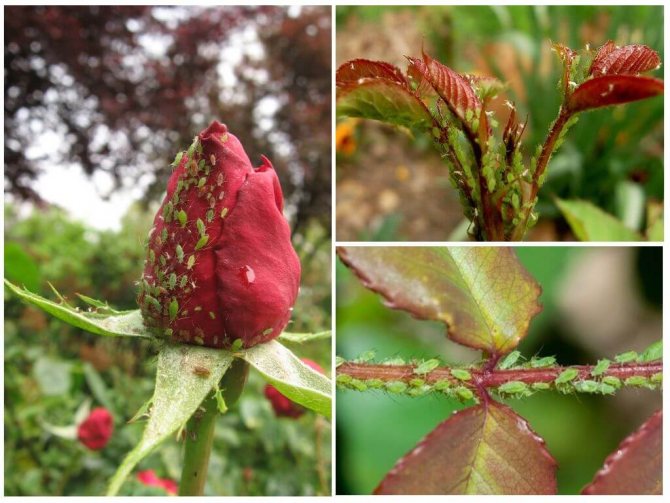

Aphid colonies destroy rosebuds.
The parasite enters the home culture in several ways:
- through a window or window;
- when brought into the house on clothes or shoes;
- at the time of finding a rose on an open balcony;
- with brought bouquets;
- from contaminated soil.
After entering the house, the parasite begins to actively inhabit the plant in the presence of favorable conditions.
The breeding of aphids on a rose is facilitated by violations of the rules of care, which includes the following:
- Hygiene. The plant requires regular pruning and showering. Well-groomed roses resist pest infestations better. The plant requires special care in the summer, because in a warm microclimate, the parasite multiplies more actively.
- Excess nitrogen fertilizers. With excessive feeding, the structure of flower tissues becomes less dense, their juiciness increases, which attracts pests.
- Quarantine. Any plant purchased must be kept separate for several weeks. This will prevent parasites from moving.
Regular inspection of the plant and preventive measures are required.
Where and why does it appear?
Possible causes of aphids:
- In the soil into which the bush was transplanted, aphid eggs were laid for the winter.
- The newly acquired bush is already affected by aphids.
- A small number of insects and birds that feed on aphids.
- Spread with the help of an ant.
Ants protect aphids from other insects and transfer them from one plant to another, contributing to the emergence of new colonies and a source of food for themselves. The parasites form a colony in a few days, and during the season the number of colonies on the bushes can reach 50. Ants keep the eggs of aphids for the winter, and in the spring they carry them around the plants.
- Flying female aphids, settler - after fertilization, they fly away from the colony to lay their eggs in a secluded place.
- Pests can get on indoor roses from the street on clothes or with pets.
Mechanical disposal of aphids
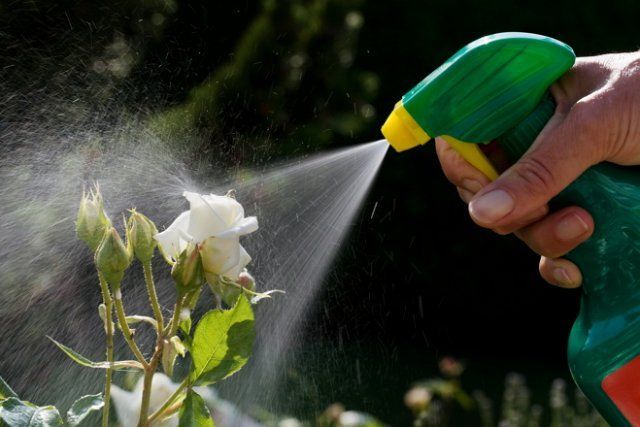

Washing off aphids with a stream of water.
Aphids can be fought mechanically, which is effective in detecting the parasite immediately after being introduced to the flower or with a small number of individuals. Means the removal of insects by hand, wearing gloves. Fingers run along the stems in the direction of flower growth.
Another method of mechanical removal is to rinse the insect off with a jet of water. The process requires careful handling so as not to damage the buds and branches of the plant.
Preventive actions
Preventing aphid infestation in roses depends to a large extent on proper care. Timely pruning, regular weed control, and control over fertilizer concentration are key to plant health. But there are aspects that increase the chances of protecting flowers.
Purchase of seedlings
When choosing planting material, you should pay attention to varieties that are resistant to aphid attacks. These include:
- hybrid variety Leonardo da Vinci;
- polyanthus rose Fairy;
- hybrid tea grade Karina.
Their peculiarity lies in the dense structure of the leaves, which the pests are not able to bite through.
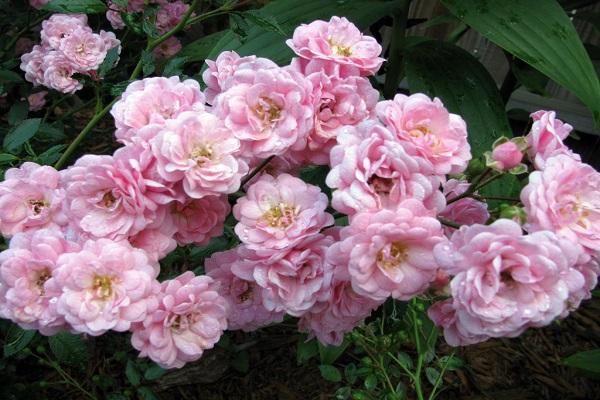

Ant neutralization
Ants are the main pests in the garden. Therefore, control measures should be directed at them as well. Limiting the access of ants to the bush will help:
- tillage of the soil around the bush with semolina or millet;
- fencing the flower bed with sawdust soaked in lavender oil.
You can also kill ants using special chemicals.
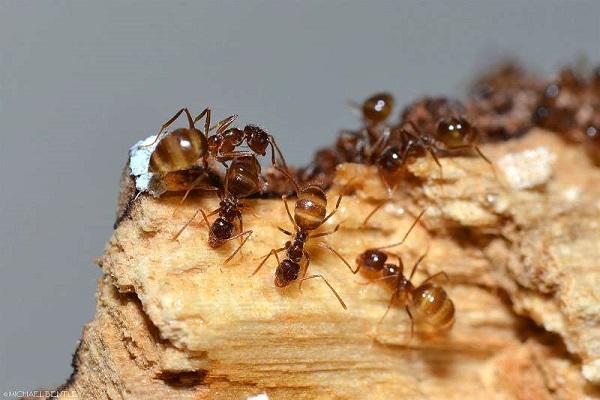

Use of biological helpers
You can fight aphids, as well as prevent its appearance on roses, with the help of plants that have a specific smell. A flower bed with roses should be supplemented with marigolds, mint, sage, garlic or dill. The aroma of these crops repels pests.
Among insects, there are also representatives that actively destroy aphids. Ladybugs are considered the most useful in this matter. They are able to destroy entire colonies of pests.
The health of a rose depends entirely on grooming. Careful attention to your pet will prevent the appearance of pests on it and reduce the risk of various diseases.
How to get rid of aphids on roses using folk remedies?
The use of folk remedies allows you to avoid exposure to chemicals on the flower. Various formulations are used to spray the crop.
Coca-Cola use
The carbonated drink contains orthophosphoric acid, which causes the death of insects. Phosphorus is a common ingredient in pesticides. The product creates a lasting effect against aphid infestations. During processing, insects die, and the plant begins to grow actively. This is due to the sugar content (glucose is the source of flower growth).
There are 2 ways to use the beverage to spray your crop:
- Mixing Coca-Cola with water. The optimal ratio is 2: 7. For extensive aphid infestation, it is recommended to use a more concentrated solution in a ratio of 5: 1. After shaking, it is necessary to let the mixture settle until the foam disappears.
- Mixing with soap. Release carbon dioxide from the drink, then add tar or liquid soap. An additional ingredient coats the leaf surface and prevents parasites from breathing.
It is not recommended to process the rose with undiluted drink, because the smell of caramel and sugar will attract other insects. Within 2 weeks, 1 or 2 treatments are carried out.
Use of kerosene
Kerosene emulsion has the ability to scare off parasites.
To prepare the composition, you must prepare:
- 200 ml of kerosene;
- 100 g soap;
- 100 ml of water (boiled).
All components are mixed until a homogeneous liquid is obtained. Then add 10 liters of warm water.
The plant is treated with the emulsion once a week. After a day after spraying, the rose must be watered abundantly with water to wash off the remnants of kerosene from the buds and leaves.
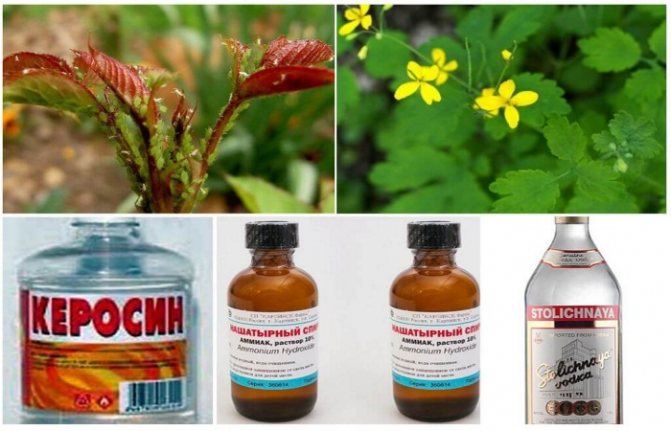

Elimination of aphids at home.
Ammonia
Thanks to ammonia in the composition of ammonia, the liquid is an effective nitrogen fertilization. For treatment against the parasite, a 3% solution is used. To spray a plant, 50 ml of the substance must be dissolved in 5 liters of water. Grated laundry soap or 2 tbsp is added to the mixture. liquid agent.
Processing is done once a week.
Celandine
Celandine juice is poisonous, leading to the death of insects. To treat a rose from aphids, you need to cut off a fresh celandine bush, chop it. Then, in a ratio of 5: 1, pour boiling water. The mixture is infused for 25 minutes.
The liquid should be filtered before processing. Spraying is carried out several times until the complete disappearance of the parasites.
To destroy aphids, celandine can be used for watering. To do this, for 10 liters of water, you need to take 0.5 kg of chopped grass. After 30 minutes, the infusion will acquire a brown tint, this indicates that it is ready for use.
A nicotinic acid
Spraying with nicotinic acid allows you to get rid of parasites in 10 days. It is necessary to dissolve 2 tablets of the drug in half a bucket of water.
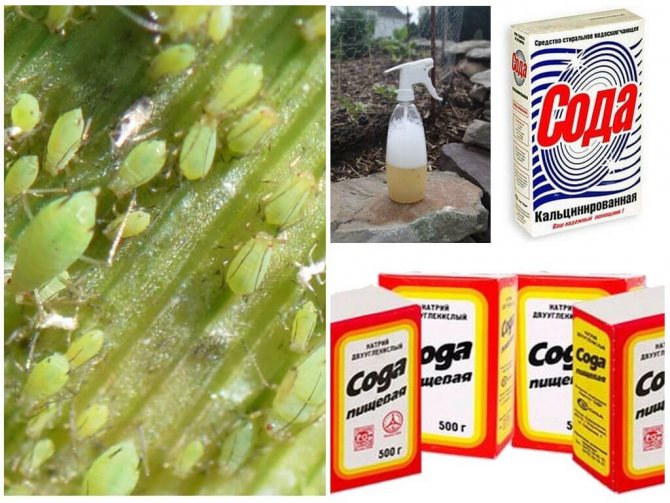

The baking soda solution will save the roses.
Using soda
The baking soda solution is rose-friendly and effectively kills aphids. Dissolve 30 g of powder in a liter of water. It is recommended to immerse the affected shoots in the solution for 15 minutes.
Citrus zest
The infusion is kept for 3 days in a warm place before processing. For 1 liter of water, you need to take 300 g of citrus peels. The prepared solution is sprayed with roses from a spray bottle.
Vinegar
The use of vinegar to treat the plant requires caution, as the substance has the ability to burn young shoots and buds. Dissolve 2 tablespoons in a bucket of water. vinegar. The solution can be sprayed on the plant or watered with a watering can.
Tar soap
This agent has a pronounced activity against parasites and insects. It can be used in all formulations with a soapy component.
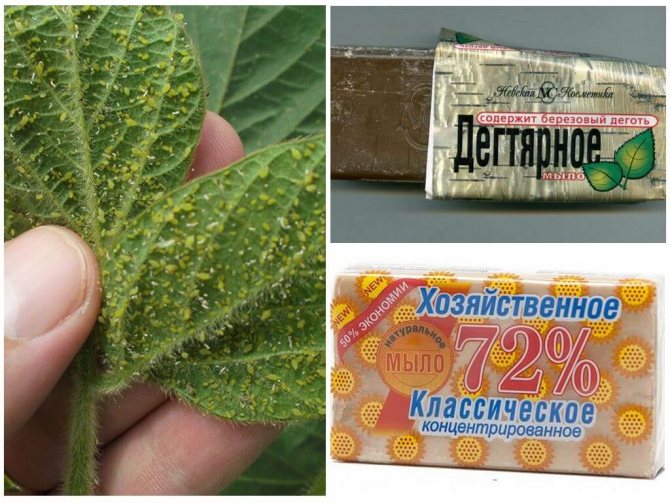

Tar soap from aphids.
High efficiency is characterized by treatment with the following solution:
- 1 kg of ash is stirred in half a bucket of water;
- the mixture is boiled and cooled;
- tar soap (30 g) is added to the broth.
The plant is sprayed with a spray bottle.
The use of iodine
An effective means of getting rid of aphid infestations is a mixture of iodine and milk.
A solution is prepared for processing:
- 0.5 ml of iodine is mixed with milk (100 ml);
- warm water is added to bring the volume of liquid to 1 liter.
The solution is used to process the stems and leaves of the plant.
Garlic
For insect control, chop 1 head of garlic and mix with 1 liter of warm water. When spraying, avoid getting the mixture on the soil. This method of getting rid of aphids is recommended to be applied before the buds appear.
Serum
To kill aphids, the rose is treated with undiluted serum. The lactic acid bacteria contained in the product slow down the development of parasites. To increase the efficiency of processing, a few drops of iodine are added to the liquid.
Aphid chemicals
Chemical preparations for indoor plants are used in the absence of a positive effect from the use of folk remedies. Purchased from specialized garden stores. The processing of the plant is carried out in a respirator and gloves.
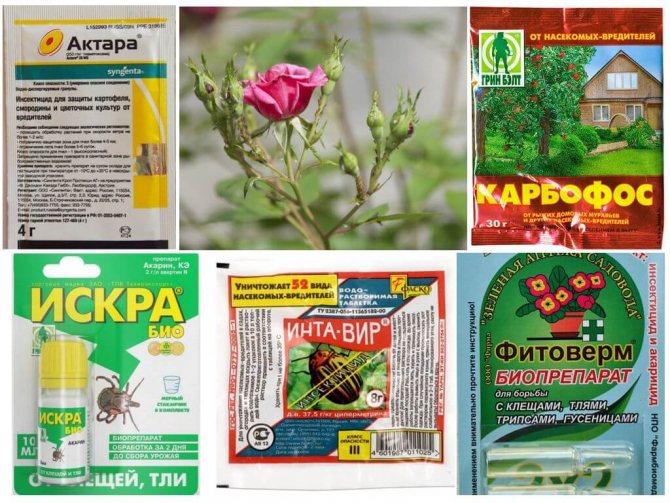

Pesticides for plant protection.
Chemicals are available in powder or tablet form. Some of them are in the form of a solution in ampoules. Before processing, the preparations must be dissolved in water at the dosages indicated in the instructions.
Examples of drugs:
- Fitoverm.Can be used during the flowering period.
- Aktara. Fast-acting insecticide, belongs to the 3rd class of toxic substances.
- Inta-Vir. Available in pill form. Treatment with the drug should be carried out at a temperature above 0 ° C.
- Spark Bio. The product contains natural ingredients.
- Dichlorvos and boric acid. The most demanded funds. For spraying with boric acid, 2 g of the drug should be dissolved in 10 liters of water. Dichlorvos is used in a bottle.
To destroy aphids, Karbofos can be used. The powder is pre-dissolved in water. The drug is toxic to humans.
When using chemicals, in most cases 1 treatment is sufficient. Re-spraying is carried out, if necessary, observing the intervals according to the instructions. After processing, dead individuals should be removed from the plant.
Cons of chemical processing
Aggressive chemicals are highly effective, but over time, aphids can develop immunity to them. Therefore, in case of a repeated invasion of parasites, it is necessary to use another drug.
Chemical treatment of a home plant can be dangerous to animals and children, so the flower pot should be removed to a separate room or placed out of the reach.
Once processed, rose petals cannot be used for cosmetic or culinary purposes.
Another disadvantage of chemical processing is the possibility of getting drugs on neighboring plants.
How can aphids be prevented?
Rose is one of the most difficult crops to care for, but with the observance of the rules of hygiene and maintenance, the appearance of parasites can be avoided.
Prevention methods include:
- timely pruning of dry leaves;
- airing the room;
- keeping the flower in a bright place;
- feeding with fertilizers;
- preventing the appearance of ants in the house;
- checking purchased bouquets, pots and soil;
- transplanting new plants into fresh clean soil.
Growing a rose requires regular washing of the upper part of the plant, maintaining an optimal indoor temperature and timely watering.
When growing crops in the open field, timely care of the garden is necessary, because parasites can appear on neighboring plants. With careful care, the rose will become a spectacular decoration of a room or a garden plot.
What to do for prevention?
In addition to alternating rose bushes with other plants, other preventive measures should be used to prevent the spread of aphids.
- Compliance with temperature and water conditions when caring for roses contributes to the formation of a strong bush that will withstand an aphid invasion.
- When buying seedlings, you should carefully examine the root system and shoots. Do not buy bushes with traces of damage to the roots or stems.
- Roses must be pruned in a timely manner, removing damaged or weak shoots, dry leaves and wilted buds.
- Do not plant roses next to viburnum, linden or plum, these plants are often affected by aphids and will serve as constant sources of the disease.
- Timely measures to prevent the accumulation of ants on the site are also good prevention of aphid infestation.
- It is necessary to carefully examine the plants and bouquets of flowers brought into the house for the presence of the parasite.

